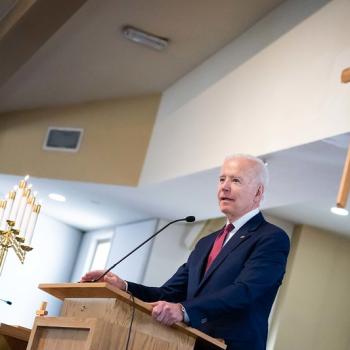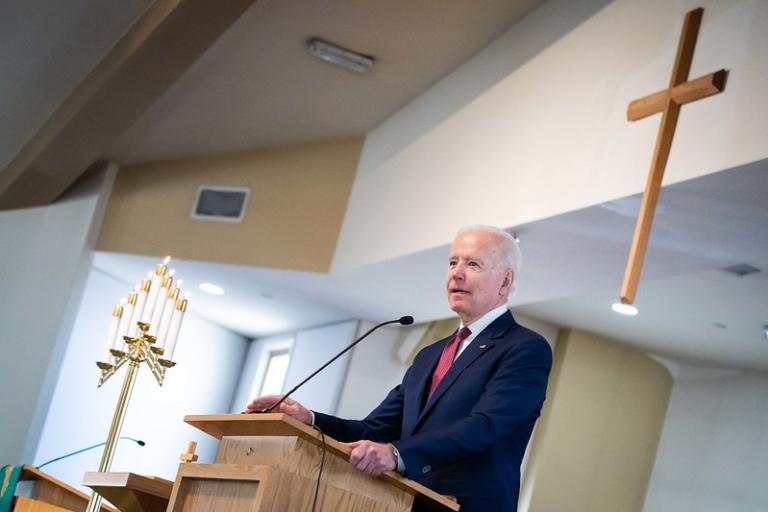Yesterday we blogged about the controversy over National Conservatism and where the church fits into that, focusing on an open letter from some prominent theologians criticizing that movement.
In my mind, Peter Leithart offers a better critique than that letter in an article published in First Things (even though the editor of that periodical, R. R. Reno, was a drafter of the “National Conservatism: Statement of Principles“). In Against National Conservatism, Leithart emphasizes that Christianity cannot be a purely national religion because it is universal and transcendent:
Christian universalism takes concrete political form in a global communion of saints. It’s an ecclesial universalism. The bonds that connect Christians across national boundaries are deeper and stronger than bonds of blood or culture; Christians are in solidarity as members of one multinational body, joined by one baptism and one Spirit, eating and drinking at the table of the one Lord. Churches exist within nations and impart many social goods, but the church isn’t a creature of the nation or the state, nor a “mediating institution,” nor an instrument of national greatness. However deeply the church, her teaching and her rituals may become embedded in a national culture, she remains essentially an outpost of an alien civilization, a heavenly one, and she exists to point the nation to ends beyond the end of the national interest. Her vocation, like the apostle Paul’s, is to bring about the obedience of faith among all nations (Rom. 1:5). She honors the king, but above all she pays homage to another king, one Jesus (Acts 17:7).
Although Leithart is taking aim against National Conservatism, it seems to me that what he says also works against the globalist vision of the signatories of the Open Letter. The church is “an outpost of an alien civilization, a heavenly one.” Christians are part of one “multinational body,” having bonds with each other that are deeper and stronger than worldly ties of blood or culture, created by baptism and the Holy Spirit. That is to say, the church is a different kind of thing than any earthly polity, whether nation or empire.
The authors of both of the contending statements posit a political role for the church. Both sides are largely integralists. They want the church to rule society.
Catholicism gave us the Holy Roman Empire, with an Emperor who ruled over multiple kings and principalities, under the temporal authority of the Pope.
Protestantism gave us nation states, with independent sovereign nations choosing their own religions and rejecting the authority of both Emperor and Pope.
So it is not surprising that some integralists will favor the nation state, and other integralists will favor some version of a trans-national empire.
My sense is that integralists are wrong, whatever their preferred polity.
Both sides violate Luther’s insight that God governs His Two Kingdoms in two different ways. The church has to do with His eternal kingdom, in which He saves fallen human beings for everlasting life, working through His Word and Sacraments He also governs the temporal realm–His whole created order, believers and non-believers alike–working through vocation, the estates of family and government, and His natural and moral Law.
Someone might object that Lutheranism had state churches. Yes, though this never meant that the churches ruled the state. It was the other way around! The states ruled the churches! In all of the state churches, the king, queen, or other national sovereign was the head the church. The devout Queen Elizabeth II was head of the Church of England, as is now the less devout King Charles III. The same held true in the Lutheran nations of Denmark, Sweden, Norway, the principalities of Germany. For awhile, at least, the state church of Finland, a republic, was under the authority of parliament.
The secular rule of the church expressed the Reformation conviction that God works through the vocation of earthly princes, and that the institutional church–as opposed to the invisible church of the saved throughout all eternity–is a temporal institution and so is subject to earthly authorities.
We Missouri Synod Lutherans fled the state church when the King of Prussia turned it into an ecumenical venture of “mixed confession,” including not only Lutherans but also Calvinists and anyone else that the King wanted to control. That was not tenable to us confessional Lutherans, so we emigrated to the United States, Australia, Canada, and other countries where we could find religious liberty.
Today, the world’s state churches have mostly embraced the secularism of liberal theology–with the exception of the Orthodox churches of Russia and other Eastern countries–so most confessional Lutherans today reject the concept, applying the doctrine of the Two Kingdoms in a more rigorous way, separating the two realms more completely.
The point is that the specific kind of government a state follows is not a theological question, though Christians are obliged to follow God’s moral law in their temporal affairs, which would include opposing injustice and supporting moral causes. The church can function in a wide range of polities, though some wage active war against Christians and their beliefs.
A polity that allows for religious liberty, including the freedom to preach and make converts, will have the best climate for the church to carry out its mission. This is why I prefer “liberal” government–that is, a system that guarantees political, economic, personal, and religious freedom–to either authoritarian nations or authoritarian empires. But that is a prudential, philosophical decision on my part, based on secular reasoning, including the history of American constitutionalism, rather than a theological dictate, as such. Though my theology makes me leery of both divinized nations and divinized empires.
Illustration, detail of the coat of arms of Żarnowiec Commune [Poland] by Bastianow (vector version) [Public domain or CC BY-SA 2.5 (https://creativecommons.org/licenses/by-sa/2.5)], via Wikimedia Commons



















